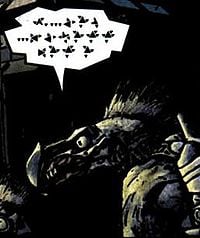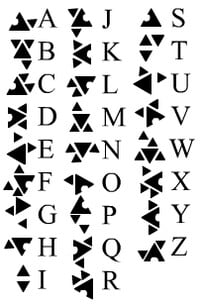Covenant languages: Difference between revisions
From Halopedia, the Halo wiki
m (→Sangheili) |
Sith Venator (talk | contribs) No edit summary |
||
| Line 1: | Line 1: | ||
{{Ratings}} | {{Ratings}} | ||
{{Era|H1|FOR|FS|GOO|HGN|UP}} | {{Era|H1|FOR|FS|GOO|HGN|UP|CH|}} | ||
{{cleanup}} | {{cleanup}} | ||
Revision as of 21:39, April 16, 2009
| This article does not meet the wiki's general standards and/or standards on layouts. You can help by cleaning this article. |


- "Their language doesn't translate in a literal manner, and each word has multiple meanings."
- — Cortana[1]
Members of the Covenant had their own unique languages. The races did not speak the same language due to evolutionary design restrictions; for example, the Kig-Yar cannot speak anything other than a hissing sound. To facilitate easier communications between member species, translation software was used on Covenant ships to decipher words.
However, the main Covenant language seems to be Sangheili, as most of the Covenant names are Sangheili words e.g. Unggoy. This is mentioned in Halo: Ghosts of Onyx.
The languages in their original form are heard in Halo: Combat Evolved. In Halo 2, their words are translated for the convenience of the player. Elites in Halo 1 spoke a deep, warbling tongue. This Rewas achieved by playing in reverse the voice acting of David Scully. The ever popular "Wort wort wort!" shouted by many Elites during gameplay is actually "Go go go!" reversed and sped up. The hissing-like language of the Jackals is actually the English language reversed. This, and the other Covenant languages (Drones, Hunters), have remained the same since Halo 2.
Written Language
Conversations from the Universe contains letters written by the Prophets of Truth and Supposition. The writing in these letters resembles English, with various alterations. This may be due to a connection between Covenant or Forerunner texts and English texts, or simply thanks to literary license on Bungie's behalf.
Before the release of Halo 2, the official website was made to look like a Covenant computer complete with a Covenant language. This language was a simple cipher with characters made from triangular shapes.
Text, or writing, in the Covenant appears to be mostly triangle shapes and composed almost completely of equilateral triangles, except for a single shape. It has been noted that this form of text was useful for both Brutes and Jackals in Halo: Uprising Issue 1 so far. Whether all of the species that are or were in the Covenant use this form of text is currently unknown.
A panel showing a Jackal's language suggests that the UNSC had only translated the direct equivalents of the English counterparts. Due to no other example of the language, the other characters would have been harder to translate. When compared with the translation chart, the only symbol the UNSC translated, that appeared in the Jackal speech, was the Covenant equivalent of the letter "Z".
Like the written language of the Forerunners, some of the undecipherable symbols seem to be rotated versions of previous symbols. One example is the 3rd letter on the 2nd like of the speech of the Jackal in the above comic panel, which is the Covenant equivalent of the letter F, which appears as an English F 270°.
Languages
Unggoy
Their native language is composed of dog-like barks, squeaks, and grunts. Though largely unintelligible to most humans, translation software is able to decipher the meanings of these.[2] The word "Unggoy" itself is not a word from their vocabulary - rather, it is the Sangheili name for their species.[3] Unggoy are also fully capable of speaking a variety of human languages, a fact that they take great pride in.
Kig-Yar
Kig-Yar language seems to consist of a range of hisses and growls, though it is intelligible to other members of the Covenant.[4][5][6][7] It is likely that they speak the Sangheili language, the distortion caused by their different physiology.
Huragok
Huragok are the only known species in the Covenant to possess more than one language. One is a verbal language, consisting of whistles and chirps, used to convey orders between Huragok and their superiors, usually a Ship Master and their crew[8]. The second is a sign language, using the different shapes and positions of tentacles to convey different meanings. The Huragok sign language can be learned by other species, including Unggoy, though their inferior dexterity makes forming the shapes a cumbersome task.[9]
Yanme'e
Yanme'e use a system of chirps, clicks and buzzes to convey information between other members of the hive, rubbing their wings together to produce such sounds, similar to Earth crickets. Translator units are required for other species to understand them.[10]
Lekgolo
Lekgolo communication is problematic at best. Between different Mgalekgolo forms, and individual Lekgolo worms, they use resonance that only their own species can hear and understand[11]. For inter-species communications, Mgalekgolo are capable of speaking at least the Sangheili language.[12]
Jiralhanae
The native Jiralhanae language is animalistic, incorporating a wide range of sounds from growls and barks, to full-out howls and roars[13][14], though as seen in Halo: Contact Harvest, Brutes also express emotions through scents and musk's. Jiralhanae are also capable of speaking the Sangheili language.[15]
Sangheili
Though originating with the Sangheili, their language has come to be the Covenant lingua franca, used to connect the different races and species. It is seemingly based upon the Forerunner language[16], likely pieced together from fragments recovered on Forerunner relics.
A few words, and their meanings, are known:
- Unggoy - Grunt
- Kig-Yar - Jackal
- Sangheili - Elite
- Yanme'e - Drone
- Jiralhanae - Brute
- Lekgolo - Hunter
- San' shyuum - Prophet
- Huragok - Engineer (taken from the Forerunner name "Huragok")
- Wort - Go
San' Shyuum
Based on religious sermons by the Prophet of Regret on Delta Halo, the native Prophet language is similar to Medieval Gregorian-style chanting.[17] Whether this is spoken by all San'Shyuum, or if it is a special dialect for religious purposes is unknown.
Sources
- ^ Halo: First Strike, page 156
- ^ Conversations From The Universe
- ^ Halo: Ghosts of Onyx
- ^ Halo: Combat Evolved
- ^ Halo 2
- ^ Halo 3
- ^ Halo: Contact Harvest
- ^ Halo: First Strike
- ^ Halo: Contact Harvest
- ^ Halo: Contact Harvest
- ^ Halo: Contact Harvest
- ^ Halo: Ghosts of Onyx
- ^ Halo 3
- ^ Halo: Contact Harvest
- ^ Halo: Contact Harvest
- ^ Halo: Ghosts of Onyx
- ^ Halo 2, Delta Halo (Level)
